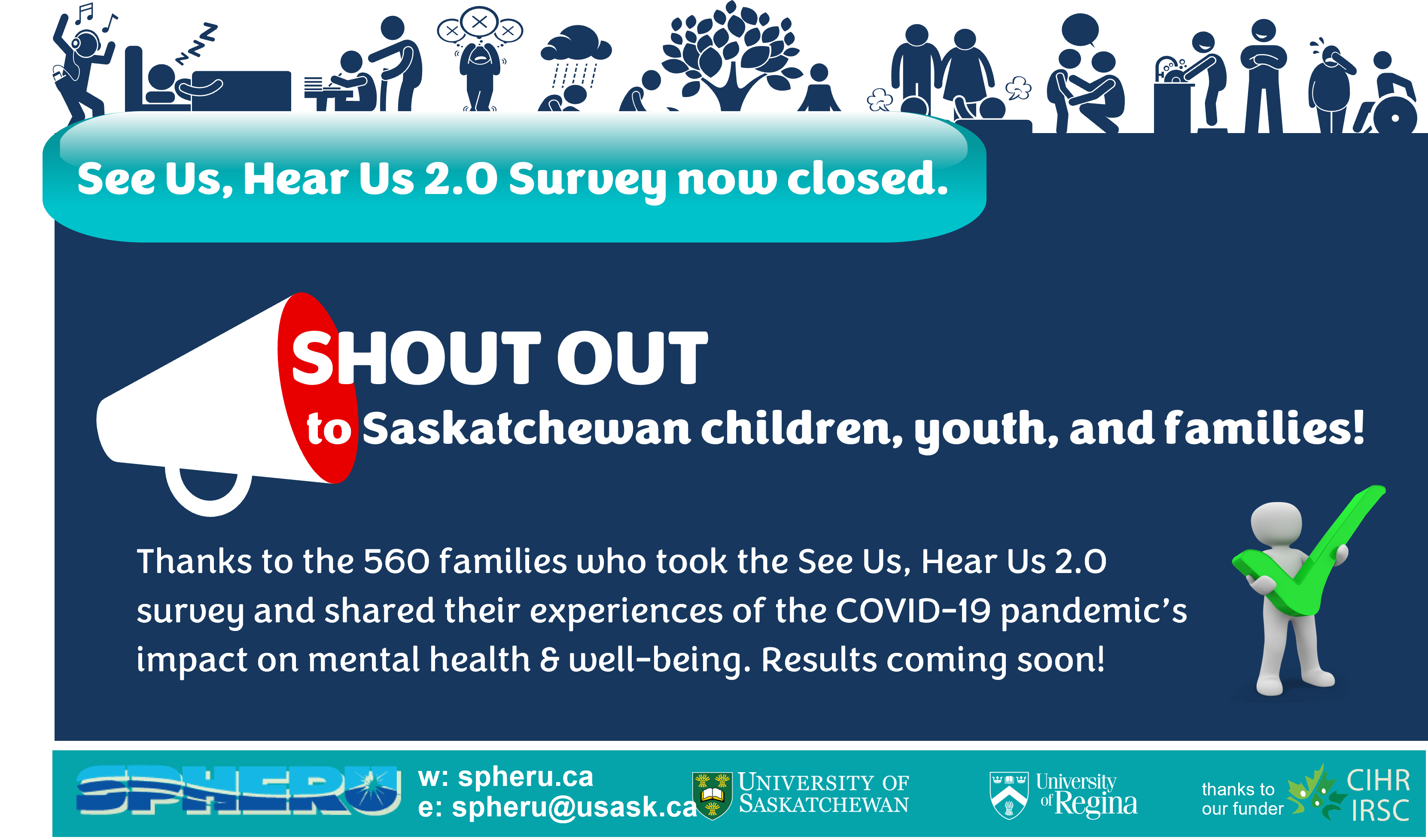About SUHU 2.0

Last spring, 510 families (1,020 parents/caregivers and their children aged 8-18) across Saskatchewan shared their experiences of the pandemic with our team of researchers and mental health practitioners at the University of Saskatchewan through our See Us, Hear Us 1.0 survey. This helped us understand and document how the first year of the pandemic affected Saskatchewan families, their mental health needs, and if these needs were being met. Results from that survey are available here.
Building on our See Us, Hear Us 1.0 study examining impacts of the first year of the pandemic on Saskatchewan children, youth, and families, our 2.0 project extends it to the future: investigating children/youth mental health into the second year of the pandemic. Thanks so much to the 560 families (1,120 parents/caregivers and their children aged 8-18) across Saskatchewan who shared their experiences of the pandemic with our team for See Us, Hear Us 2.0.
Four questions were addressed by the 2.0 survey:
- Are children’s and youth’s mental health and quality of life outcomes different in 2022 in comparison to the outcomes in April-July 2021?
- What coping strategies are utilized, if any, and what is the association between these coping strategies and mental health and quality of life outcomes?
- What role have mental health services played in helping young people deal with the challenges of the pandemic?
- How are sociodemographic characteristics (e.g., sex at birth, self-declared gender, disability, family income, culture/ethnicity, immigrant status) associated with these variables?
The ultimate aim is to provide evidence-based recommendations to decision-makers and practitioners that, if acted on, will improve the mental health well-being of children and youth in Saskatchewan.
If you have questions about our research project, please email seeus.hearus@usask.ca or contact:
Dr. Nazeem Muhajarine
Saskatchewan Population Health and Evaluation Research Unit (SPHERU)
Department of Community Health and Epidemiology, University of Saskatchewan
t: 306-966-7940 e: nazeem.muhajarine@usask.ca
Funder

CIHR Funding Announcement:
If you and/or your child have a medical or mental health emergency, call 911 or go to the nearest open clinic or emergency room. If you are concerned that you and/or your child are a danger to yourself and/or themselves or to others, call 911 or go to the nearest open clinic or emergency room.
If you and/or your child need help with how you are feeling:
- Talk to someone you trust and encourage your child to talk to you or another person they trust
- Connect with your health and/or mental health care provider (e.g., doctor, nurse practitioner, counsellor, social worker, psychiatrist, etc.).
- Access free mental health and COVID-19 resources available to you online or by phone, including:
- 8-1-1: you can call the Government of Saskatchewan’s confidential, free, 24-hour health and mental health and addictions advice, education, and support telephone line available to the people of Saskatchewan, staffed by experienced and specially trained Registered Nurses, Registered Psychiatric Nurses, and Registered Social Workers.
- If you are having technical issues with accessing HealthLine 811 by dialling 811, you can call 1-877-800-0002 to be connected with HealthLine 811.Deaf and hard of hearing residents can access HealthLine 811 by using the SaskTel Relay Operator service at 18008550511.
- Government of Saskatchewan Mental Health and COVID-19 Resources:
- Coping, Parenting, and Mental Health Community Resources: https://www.saskatchewan.ca/government/health-care-administration-and-provider-resources/treatment-procedures-and-guidelines/emerging-public-health-issues/2019-novel-coronavirus/mental-health-and-covid-19
- COVID-19 Information and Resources: https://www.saskatchewan.ca/government/health-care-administration-and-provider-resources/treatment-procedures-and-guidelines/emerging-public-health-issues/2019-novel-coronavirus
- Kids Help Phone: call, text, message, or chat with Kids Help Phone any time at 1-800-668-6868 or kidshelpphone.ca.
- Government of Canada COVID-19 Information and Resources: https://www.canada.ca/en/public-health/services/diseases/coronavirus-disease-covid-19.html
- 8-1-1: you can call the Government of Saskatchewan’s confidential, free, 24-hour health and mental health and addictions advice, education, and support telephone line available to the people of Saskatchewan, staffed by experienced and specially trained Registered Nurses, Registered Psychiatric Nurses, and Registered Social Workers.
See Us, Hear Us Research Team
Principal Investigators:
 Dr. Nazeem Muhajarine
Dr. Nazeem Muhajarine
Department of Community Health and Epidemiology
College of Medicine, University of Saskatchewan
Saskatchewan Population Health and Evaluation Research Unit (SPHERU)
t: 306.966.7940 e: nazeem.muhajarine@usask.ca
 Dr. Tamara Hinz
Dr. Tamara Hinz
Department of Psychiatry
College of Medicine, University of Saskatchewan
Saskatchewan Health Authority
t: 306.844.1004 e: tamara.hinz@usask.ca
Researchers:
- Daniel Adeyinka, Postdoctoral Fellow, Researcher, SPHERU and Community Health & Epidemiology, University of Saskatchewan, e: daa929@mail.usask.ca
- Jane Macleod, Senior Manager, Research and Records, Saskatchewan Teachers’ Federation
- Jessica McCutcheon, Survey Research Manager and Specialist, CHASR, USask, e: mccutcheon@usask.ca, t: 306.966.6525
- Kathryn Green, former Faculty, Community Health & Epidemiology, USask
- Natalie Kallio, Research Officer, SPHERU, USask, e: natalie.kallio@usask.ca t: 306.966.2237
- Nuelle Novik, Associate Professor, Social Work, URegina and SPHERU
- Tom McIntosh, Professor, Politics & International Studies, URegina, SPHERU Co-Director
- Victoria Taras, Research & Policy Analyst, Saskatchewan Teachers' Federation
- Yvonne Hanson, Patient partner/Provincial Manager PIHCIN, USask
- and all our partners, collaborators, community council members, and knowledge users
Student Researchers:
- Isabelle Dena, PhD student, Community Health & Epidemiology/RSW
- Jovana Miladinovic, Medical student, USask
- Marin Habbick, Queens University Visiting Research Student, USask
- Raina Kim, Medical student, USask
- Sahana Ramamoorthy, MSc student, Community Health & Epidemiology, USask
- Vaidehi Pisolkar, PhD student, Community Health & Epidemiology
Thanks so much to the 560 families (1,120 parents/caregivers and their children aged 8-18) across Saskatchewan who shared their experiences of the pandemic with our team of researchers and mental health practitioners at the University of Saskatchewan in our See Us, Hear Us 2.0 survey.

These data will help our research team understand and document how the pandemic affected Saskatchewan families, their mental health needs, and if these needs were being met. Our focus now is on analyzing the data and understanding mental health, well-being, and resiliency from the perspective of children their and parents’/caregivers’ and current need for mental health services and supports. We will share what we learn from the study with you (results will be posted one this page) and with people who make decisions about mental health services and mental health care providers, and will urge them to use it to improve services in Saskatchewan.
If you have questions, please contact us at seeus.hearus@usask.ca.
Dr. Nazeem Muhajarine
Department of Community Health and Epidemiology, College of Medicine, University of Saskatchewan
Saskatchewan Population Health and Evaluation Research Unit (SPHERU)
t: 306-966-7940 e: nazeem.muhajarine@usask.ca
Dr. Tamara Hinz
Department of Psychiatry, College of Medicine, University of Saskatchewan
t: 306-844-1004 e: tamara.hinz@usask.ca
This research study has been reviewed and approved by the University of Saskatchewan Behavioural Research Ethics Board (Beh-2561).
SUHU 2.0 Results
Research Brief
See Us Hear Us 2.0 Research Brief #1 - September 2022
The SUHU 2.0 survey investigates the mental health of children and youth in the 2021-22 school year. In this brief we present preliminary descriptive results focused on a few central questions; subsequent reports will provide more detailed analyses, including additional data on health behaviours, coping, social
support, and help seeking.
SUHU 2.0 Data Posters
SK Epidemiology Assoc, Poster Contest 2023
SPHERU was proud to have several Master's students participate in the annual poster contest at the Saskatchewan Epidemiology Association's 22nd Symposium event in Saskatoon.
See Nahin Shakurun's poster Mood States of of youth in SK during the 2nd Year of the Pandemic here.
See Kirrat Ahmed's poster See Us, Hear Us Children, youth & families coping with Mental Health during the Pandemic here.
